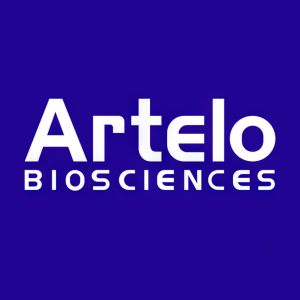Artelo Biosciences Announces Expanded Clinical Data to be Presented on both ART26.12 and ART27.13 at the 8th Annual Cannabinoid & Endocannabinoid Drug Development Summit
Rhea-AI Summary
Artelo Biosciences (Nasdaq: ARTL) will present expanded clinical data on ART26.12 and interim Phase 2 data on ART27.13 at the 8th Annual Cannabinoid & Endocannabinoid Drug Development Summit on October 15–16, 2025 in Boston.
Key findings: ART26.12 single ascending dose study showed safety at single doses up to 1050 mg, predictable linear plasma exposure, and potential dosing flexibility in fed or fasted states. ART27.13 Phase 2 interim data in cancer anorexia showed treated patients (up to 1300 µg/day on average) gained >b>6% body weight versus placebo patients who lost an additional 5%, with a similar tolerability profile to earlier stages to date.
Positive
- ART26.12 safe at single doses up to 1050 mg
- ART26.12 demonstrated predictable linear plasma exposure
- Fed/fasted dosing flexibility observed for ART26.12
- ART27.13 Phase 2 interim: treated patients gained >6% weight
- Placebo patients in CAReS lost an additional 5% body weight
- ART27.13 orally once-daily and most clinically advanced small-molecule for cancer anorexia
Negative
- None.
News Market Reaction
On the day this news was published, ARTL gained 1.45%, reflecting a mild positive market reaction. Argus tracked a peak move of +3.8% during that session. Our momentum scanner triggered 5 alerts that day, indicating moderate trading interest and price volatility. This price movement added approximately $130K to the company's valuation, bringing the market cap to $9M at that time.
Data tracked by StockTitan Argus on the day of publication.
ART26.12 Phase 1 Data Demonstrated No Safety Concerns, Predictable Linear Plasma Exposure, and Options for Dosing in Either Fed or Fasted Conditions
ART27.13 Interim Phase 2 Data Showed Substantial Weight Gain and Activity Improvements in the Treated Patients versus Placebo
SOLANA BEACH, Calif., Oct. 15, 2025 (GLOBE NEWSWIRE) -- Artelo Biosciences, Inc. (Nasdaq: ARTL), a clinical-stage pharmaceutical company focused on modulating lipid-signaling pathways to develop treatments for people living with cancer, pain, dermatologic, or neurological conditions, today announced that Professor Saoirse O’Sullivan, Vice President of Translational Sciences at Artelo Biosciences, is presenting expanded data from Artelo’s lead Fatty Acid Binding Protein 5 (FABP5) inhibitor, ART26.12, Single Ascending Dose (SAD) Study at the 8th Annual Cannabinoid & Endocannabinoid Drug Development Summit, taking place October 15–16, 2025, in Boston, Massachusetts. In addition, Professor O’Sullivan will be giving additional insights on ART27.13 development progress in cancer-related anorexia with interim data from the Phase 2 portion of the Cancer Appetite Recovery Study (CAReS).
During the presentation titled Exploring the Clinical Development of the Fatty Acid Binding Protein 5 (FABP5) Inhibitor ART26.12, Professor O’Sullivan plans to share findings from the Company’s SAD study and preliminary food effect investigation with ART26.12, which evaluated the safety, tolerability, and pharmacokinetics of its FABP5 inhibitor in healthy volunteers. The SAD study demonstrated that ART26.12 at single doses up to 1050 milligrams was safe and well tolerated. Importantly, ART26.12 exhibited predictable linear dose exposure and showed potential dosing flexibility in either fed or fasted states for future studies. These findings support Artelo’s belief that advancement of ART26.12 into multiple ascending dose and proof-of-principle pain studies is warranted.
In addition, Professor O’Sullivan will discuss detailed interim data from the CAReS Phase 2 study. In CAReS, Artelo is evaluating ART27.13, the Company’s proprietary dual cannabinoid agonist, versus placebo in a randomized and blinded comparison in cancer patients experiencing anorexia and weight loss. Initial findings show patients receiving up to 1300 micrograms daily on average gained over
Regarding Artelo’s innovation leadership and progress in cannabinoid and lipid-signaling therapeutics development, Professor Saoirse O'Sullivan stated, "Having spent my entire career researching the potential medical benefits of modifying the endocannabinoid system, it is gratifying as a scientist and affirming of our research initiatives to be at the Cannabinoid & Endocannabinoid Drug Development Summit presenting two positive clinical studies for two of Artelo’s development candidates that have the potential to impact the devastating effects of peripheral neuropathic pain and anorexia and cachexia syndrome for people living with cancer."
About ART26.12
ART26.12, Artelo’s lead Fatty Acid Binding Protein 5 (FABP5) inhibitor, is under development as a novel, peripherally acting, non-opioid, non-steroidal analgesic, initially for the treatment of chemotherapy-induced peripheral neuropathy (CIPN) under an investigational new drug application opened with the FDA. Fatty Acid Binding Proteins (FABPs) are a family of intracellular proteins that chaperone lipids important to normal cellular function. FABP is overexpressed and associated with abnormal lipid signaling in a number of pathologies. In addition to ART26.12 in CIPN, Artelo’s extensive library of small molecule inhibitors of FABPs has shown therapeutic promise for the treatment of certain cancers, neuropathic and nociceptive pain, psoriasis, and anxiety disorders.
About ART27.13
ART27.13 is a novel benzimidazole derivative being developed as a once-daily, orally administered agent selectively targeting peripheral CB1 and CB2 receptors, with the potential to improve body weight, appetite, muscle degeneration, and quality of life in cancer patients. Initially developed by AstraZeneca plc, ART27.13 has been in seven clinical studies with over 280 participants. A statistically significant and dose-dependent increase in body weight was observed in people with back pain who were otherwise healthy. Importantly, the drug enables systemic metabolic effects while minimizing central nervous system-mediated toxicity. Having completed a Phase 1 study in cancer patients where ART27.13 demonstrated an excellent safety profile, Artelo is conducting a Phase 2 trial as a supportive care therapy for cancer patients suffering from anorexia and weight loss. Currently, there is no FDA approved treatment for cancer anorexia cachexia syndrome.
About CAReS
The Cancer Appetite Recovery Study (CAReS) is a Phase 1/2 randomized, placebo-controlled trial of the Company’s lead clinical program, ART27.13, in patients with cancer anorexia and weight loss. Cancer-related anorexia, or the lack or loss of appetite in the person with cancer, may result from the cancer and/or its treatment with radiation or chemotherapy. It is common for people with cancer to lose weight. Anorexia and the resulting weight loss can affect a patient’s health, often weakening their immune system and causing discomfort and dehydration. A weight loss of more than
(ISRCTN registry: https://www.isrctn.com/ISRCTN15607817)
About Artelo Biosciences
Artelo Biosciences, Inc. is a clinical-stage pharmaceutical company dedicated to the development and commercialization of proprietary therapeutics that modulate lipid-signaling pathways, with a diversified pipeline addressing significant unmet needs in anorexia, cancer, anxiety, dermatologic conditions, pain, and inflammation. Led by an experienced executive team collaborating with world-class researchers and technology partners, Artelo applies rigorous scientific, regulatory, commercial, and treasury management practices, including digital assets, to maximize stakeholder value. More information is available at www.artelobio.com and X: @ArteloBio.
Forward Looking Statements
This press release contains certain forward-looking statements within the meaning of Section 27A of the Securities Act of 1933 and Section 21E of the Securities Exchange Act of 1934 and Private Securities Litigation Reform Act, as amended. These forward-looking statements are based on current expectations, estimates, forecasts and projections about the industry and markets in which we operate and management’s current beliefs and assumptions. These statements may be identified by the use of forward-looking expressions, including, but not limited to, “expect,” “anticipate,” “intend,” “plan,” “believe,” “estimate,” “potential,” “predict,” “project,” “should,” “would” and similar expressions and the negatives of those terms. These statements relate to future events or our financial performance and involve known and unknown risks, uncertainties, and other factors which may cause actual results, performance or achievements to be materially different from any future results, performance or achievements expressed or implied by the forward-looking statements. Such factors include those set forth in the Company’s filings with the Securities and Exchange Commission, including our ability to raise additional capital in the future. Prospective investors are cautioned not to place undue reliance on such forward-looking statements, which speak only as of the date of this press release. The Company undertakes no obligation to publicly update any forward-looking statement, whether as a result of new information, future events or otherwise, except to the extent required by applicable securities laws.
Investor Relations Contact:
Crescendo Communications, LLC
Tel: 212-671-1020
Email: ARTL@crescendo-ir.com









